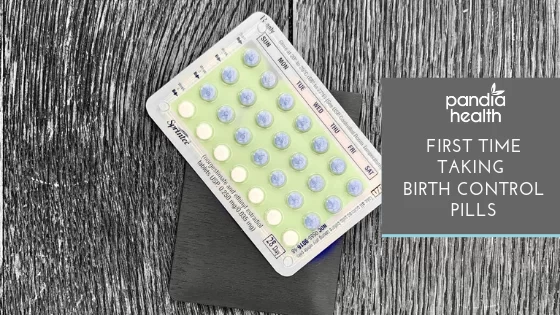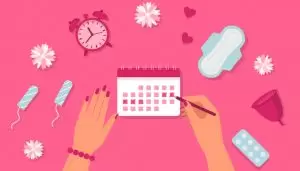Medically reviewed by Sophia Yen, MD, MPH – Written by Pandia Health Editorial Team. Updated on February 16, 2021
First time taking the birth control pill newbie and have no idea where to start? Wondering how to start your pills? Look no further! Dr. Sophia Yen, co-founder of Pandia Health, broke down some of the top tips to keep in mind when starting birth control! So without further ado, let’s get right into it!
1: Best Time to Take the Pill
This is typically the first tip that Dr. Yen gives to women who are taking birth control pills for the first time, for a few reasons.
The time you take your pill is very important, so it’s good to find the optimal time for you.
Dr. Yen recommends taking your pill right before bed because it can help dispel nausea some experience when taking the pill. If you take the pill on an empty stomach, you may be more likely to experience nausea. Additionally, taking the pill right after you’ve eaten can decrease the likelihood of experiencing other unpleasant symptoms.
The best time of the day to take birth control pill is in the evening, either just before you go to bed or around dinner time, says Dr. Yen. Our a recent interview, she said, “In the 19+ years that I’ve been prescribing women birth control, I’ve only had 2 women who woke up from sleep with nausea. Everyone else has been totally fine.”
If you still have nausea after a week of taking the pill before bed, take it around dinner time or whenever you have your largest meal.
Another good reason to take the pill at this time is that it’ll help with consistency. It is advised that you take the pill at the same time every day, or at least as close as you can. This is because their effectiveness can decrease if you skip a pill or take them at completely different times of day, say 8am one day and 5pm the next. Dinner and bedtime happen every day, giving you a good time marker to take your pill.
If you are taking progesterone only pills it is extremely important you take the pill at same time every day for it to be effective. If you are late by 3 hours, the pill will NOT be effective and you will need to use emergency contraception if you had sexual intercourse in the past 5 days of being late taking your pill. It’s also recommended to use another backup method like condoms for the next 5 days, while the hormone level gets up to the level it needs to be to protect you from pregnancy.
2: When Should I Start Taking the Pill
Although you can start birth control at any time, Dr. Yen recommends taking your first pill on the last day of your period. This allows the uterus to clean out, as you will have just had your period so you can have a fresh start and will avoid spotting or breakthrough bleeding.
3: Birth Control Pills May Not Work Immediately
If you are taking progesterone only pills, these will start working to prevent pregnancy after 2 days. That’s why you should use another barrier method of birth control such as condoms the first couple of days. We also encourage you to use condoms to prevent STIs (Sexually Transmitted Infections like HIV, HSV, Gonorrhea, Chlamydia).
If the combination birth control pill is your medication and you start taking it at the end of your period, it should start working right away. But just to be safe, our expert birth control doctors recommend using back up for at least a week, ideally 1 month. That being said, if you have a BMI of 30 or greater, it may take up to a week for your body to recognize the new hormones introduced by the pill. Either way, it is a best practice to use condoms while taking your first pack of birth control to ensure protection against pregnancy and prevent STIs.
If you started your combination birth control pill not on your period nor the last day of it, you will be protected from pregnancy after 2 to 3 weeks. We encourage you to keep using other barrier method while taking your first pack of pills, as we mentioned before and in general to prevent sexually transmitted infections.
Order Birth Control Pills Online
Consult with our expert doctors to find the right birth control method for you and get your prescription delivered for FREE!
4: Give your body some time to adjust
Give your body at least 2-3 months for your body to get used to any pill. We know the first few weeks can be bumpy, but it takes time for your body to adjust to the medication and hormones.
Even though you may be getting protection right away, your body may need some extra time to get used to it. For example, you may experience some spotting or bleeding between periods. This is your body’s natural reaction to the introduction of new hormones, and it’s nothing to be worried about.
Contact your doctor if you begin to experience symptoms that negatively impact your quality of living. This will help you determine what could be going on in your body and if you should consider trying another type of birth control. This leads us on to…
5: Everybody is unique and may require something different
Thankfully if you dislike the first type of birth control you are prescribed, there are plenty of other options that you can try.
At this stage, it is important to stay in touch with your doctor as they will want to review your reaction and help you find your perfect birth control match if you experience unwanted side effects.
If you are looking for an indication of what type of birth control will work for you, you can try asking your female relatives, such as your mom, sister, or other blood-relatives, what has worked for them.
However, it is important to recognize that every person’s body is different and thus, may require a different method of contraception.
Plus, if the pill is not for you, you can check out the patch, ring, shot, or IUD.
6: Consult a doctor for advice on which birth control is best for you
Starting birth control may seem like a scary process! Thankfully, you don’t have to go about it alone.
Although you don’t need to work with an OB-GYN to get a prescription for birth control, that may be a good place to start if you’re nervous. This type of doctor will have more experience helping women improve their reproductive health and will be best placed to answer any questions you may have.
Starting birth control may seem like a scary process! Thankfully, you don’t have to go about it alone. Although you do not need to work with an OB-GYN to get a prescription, that may be a good place to start, as this type of doctor will have more experience helping women improve their reproductive health.
How can Pandia Health help?
The pill you’re prescribed will depend on many factors, including your health history, BMI and age. At Pandia Health, we pride ourselves on prescribing birth control based on how your body will react.
We’re the ONLY doctor founded and led birth control company and are here to help make your birth control experience as positive as possible.
With extended hours available seven days a week, our expert doctors are on hand to prescribe the right birth control for you.
With just one $30 payment a year, you can get access to our expert doctors for 364 days (available if you live in AZ, CA, CO, FL, GA, MN, MI, NV, NY, IL, OH, TX, PA, and WY). That means unlimited questions and advice, which is especially important if you want to change your birth control. Get started to begin your birth control journey today!
Speaking of doctors Pandia Health is proud to be the ONLY #DoctorFounded and #DoctorLed birth control delivery company. Our expert doctors are here to help make your birth control experience be as positive as possible.
If you don’t live at any of the States where we offer telemedicine, you can still enjoy our free delivery service. Simply transfer your current birth control prescription to our pharmacy to get your birth control delivered right to your mailbox.
With Pandia Health, you can #SkipTheTrip to the pharmacy and feel confident that you will never run out of birth control on our watch.
Disclaimer: The above information is for general informational purposes only and is NOT a substitute for professional medical advice. Always seek the advice of your doctor/primary care provider before starting or changing treatment.



